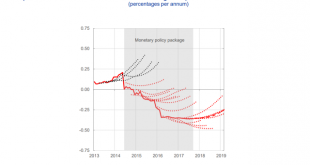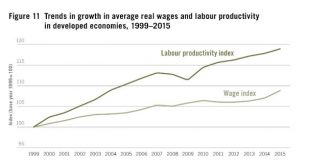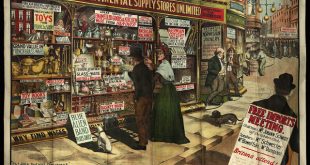Peter Praet's speech at the Money, Macro and Finance conference last week was a goldmine. I've already discussed the central bank credibility problem revealed by his final slide. But his presentation went far, far wider than central banks. It raised serious questions about the future of the global economy.This slide - the first in his presentation - shows that there have been three significant global shocks in the last decade, not one: The first, obviously, is the deep global recession...
Read More »Central banks’ credibility problem
In a speech in London the other day, Peter Praet discussed the ECB's unconventional policy measures. I was there, and I have to say that he deviated considerably - and rather entertainingly - from the version of the speech on the ECB website. But his core message was still the same: "Rates are expected to remain at their present levels for an extended period of time, and well past the horizon of our net asset purchases. So, no interest rate hikes for a long time to come.But that's not what...
Read More »The UK’s political crisis
On the evening of Friday, September 22nd, the credit ratings agency Moody's downgraded the UK's credit rating. Admittedly, it was only by one notch. But coming as it did hard on the heels of Theresa May's grand speechin Florence, it was a shattering blow. Credit ratings agencies lost much of their lustre in the financial crisis of 2008, when they were revealed to have been complicit in the mispricing of complex financial derivatives – the “toxic waste” that brought down some of the...
Read More »We need to talk about productivity
"We need to discuss the complete disconnect between the marginal product of labour and labour wages," said Sir Chris Pissarides, speaking on the closing panel of the Lindau Economics Meeting.I tweeted this comment. Laurie MacFarlane of the New Economics Foundation promptly responded with this chart that brilliantly illustrates Sir Chris's point: "Quite why marginal productivity theory is still taught as something which explains the real world is beyond me," commented Laurie. Marginal...
Read More »UBI Animated Quote : Humans are not robots. -Frances Coppola
Quote by Frances Coppola. Source : http://www.independent.co.uk/voices/finland-universal-basic-income-uk-needs-to-start-testing-it-a7871596.html Help UBIVisuals contribute to the cause. #BasicIncome Patreon.com/UBIVisuals
Read More »UBI Animated Quote : Humans are not robots. -Frances Coppola
Quote by Frances Coppola. Source : http://www.independent.co.uk/voices/finland-universal-basic-income-uk-needs-to-start-testing-it-a7871596.html Help UBIVisuals contribute to the cause. #BasicIncome Patreon.com/UBIVisuals
Read More »Tariffs, trade and money illusion
In the past few days, I have read three pieces from Economists for Brexit - now renamed "Economists for Free Trade" - extolling the virtues of "hard" (or "clean") Brexit and calling for the UK to drop all external tariffs to zero unilaterally after Brexit. Two are written by professors of finance (Kent Matthews and Kevin Dowd). The third is from the veteran economist Patrick Minford.All three of these pieces wax lyrical about the benefits to GDP and welfare from unilaterally reducing...
Read More »Calculus for journalists
“What do they teach them at these schools?” wondered the Professor in C.S. Lewis's The Lion, the Witch and the Wardrobe. The Professor, of course, was concerned about logic. But I wonder too - not about logic, but about maths. Especially among journalists writing about life expectancy and other long-term trends.Here is the FT proclaiming "Average life expectancy falls". This is the headline for a chirpy piece about how reduced life expectancy could make things easier for pension funds...
Read More »Bitcoin and bimetallism
I wrote a piece on Forbes recently in which I described a bimetallic system of coinage and suggested how such a system might work - or rather, fail to work - for Bitcoin. These are the relevant paragraphs: In a bimetallic system, there are effectively two currencies which are linked by a fixed exchange rate set by fiat. At the end of the 19th century - the time of Bryan's speech - Britain's copper penny was worth 1/144 of one pound. Other denominations of coin were created by...
Read More »Crypto-tulips
Here is a very familiar financial bubble, in pictorial form: And this is what it looks like, charted: In those days, of course, tulips at least had to be able to flower. But things have changed since then.There are three key stages in the lifecycle of a financial bubble:The "Free Lunch" period. A long, slow buildup of price distortion, during which investors convince themselves that rising prices are entirely justified by fundamentals, even though it is apparent to (rational) observers...
Read More » Francis Coppola
Francis Coppola










